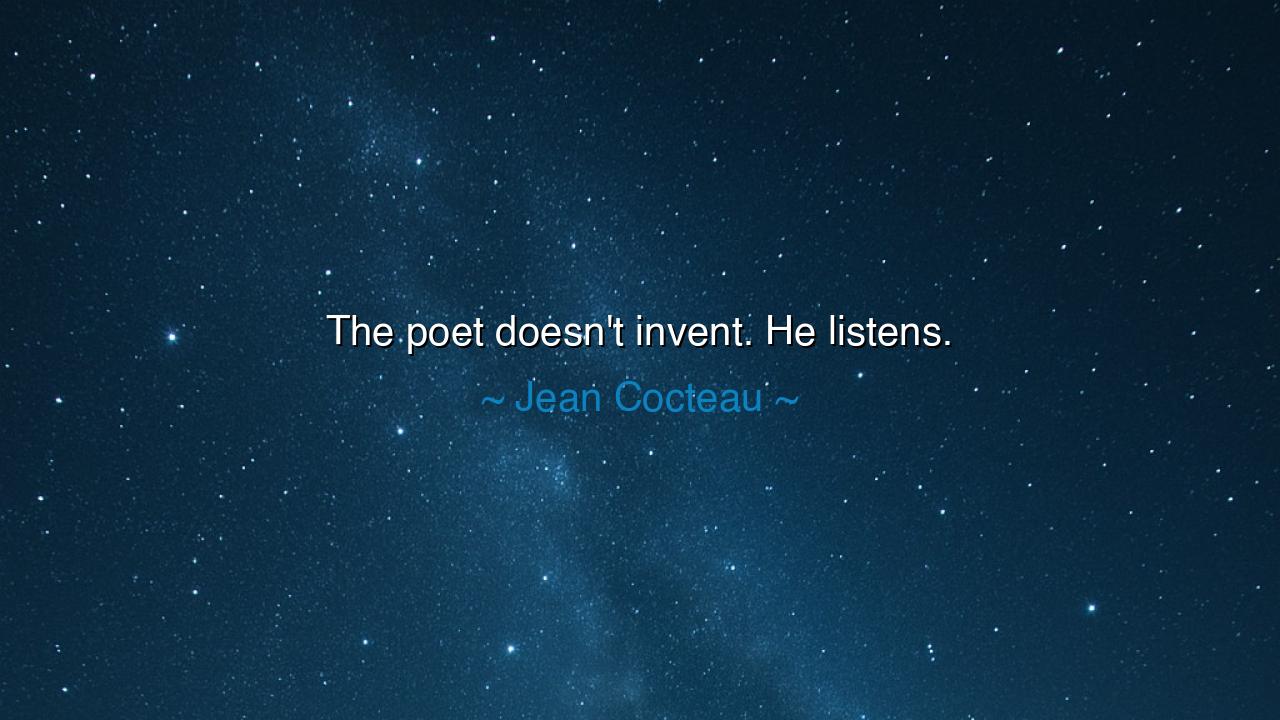
The poet doesn't invent. He listens.






Hear the words of Jean Cocteau, poet, artist, dreamer of France, who declared with luminous simplicity: “The poet doesn’t invent. He listens.” In this brief truth lies a teaching as old as the first song sung by the fireside. For the poet is not the creator of worlds in the way a god is creator. He is instead the vessel, the ear, the instrument through which the unseen and the eternal are given voice. The poet listens—to the heart, to the earth, to the murmurs of the soul, to the whispers of the divine. What he writes, he has not fabricated; he has received.
To listen is to humble oneself before the greater music of existence. The poet does not sit upon a throne commanding language; he kneels, attentive, like a disciple before a master. The rustling of leaves, the weeping of children, the laughter of lovers, the silence of death—these speak, and the poet bends his ear. In the act of listening, he becomes the bridge between the ineffable and the human tongue. Thus Cocteau teaches us that poetry is not invention but revelation.
The ancients knew this truth well. Homer called upon the Muse, not because he sought ornament, but because he believed he was not the source of his own words. The Muse spoke, and the poet listened. Likewise, the Hebrew prophets cried out, not with their own invention, but with the words they claimed were given to them by God. They were listeners, not inventors. Cocteau’s wisdom is but a modern echo of this ancient understanding: that the poet is a channel through which truth flows into the world.
History offers its proof. Consider William Blake, who spoke of visions and angels, of seeing eternity in a grain of sand. To many, he was mad; yet to him, he was only listening to what others ignored—the voices of imagination, of spirit, of hidden realms. Or think of Emily Dickinson, who, in her solitude, recorded truths so piercing that they remain alive centuries later. She did not invent her insights like a craftsman shaping tools. She listened in silence to the tremors of her own soul, and gave them form.
Yet the world often mistakes invention for greatness. We are tempted to think the poet must be clever, original, ingenious in his novelty. But Cocteau rebukes this. The poet’s genius lies not in fabrication but in attention. Many hear, but few listen. Many see, but few truly look. The poet’s task is to attend so deeply that the ordinary reveals its mystery, that the unspoken is brought into speech. In listening, the poet teaches all men to listen.
The lesson, then, is this: become a listener in your own life. Do not rush to invent explanations for all things; do not hurry to fill silence with noise. Listen to the voices around you—the cry of the oppressed, the beauty of nature, the rhythm of your own heart. Listen also to what lies beneath words: the longing, the sorrow, the joy unspoken. For in listening, you will find wisdom, and in wisdom, poetry.
Therefore, remember Cocteau’s teaching: “The poet doesn’t invent. He listens.” If you would live poetically, cultivate the art of listening—not only with your ears, but with your whole being. Let the world speak to you in its hidden languages. Let silence instruct you. And then, when you do speak, your words will carry the weight of truth, not because you have invented them, but because you have heard them in the deep places where eternity meets the soul.






TTLe Thi Tinh
Jean Cocteau’s view on poetry makes me wonder about the relationship between inspiration and creativity. If the poet is simply listening, does that mean poetry is a passive act? Or does listening itself require a certain kind of skill or openness to receive the world in its raw form? Can poetry exist without the poet’s input, or does every poem, even when ‘listened’ to, require a bit of creative shaping?
TLNguyen Do Truc Linh
Cocteau’s idea that a poet listens rather than invents shifts the focus from active creation to passive reception. It raises the question—how does a poet ensure they are ‘hearing’ the right things? What distinguishes the poet’s listening from mere observation? Is the poet’s sensitivity to the world something innate, or is it something they develop through practice and attention to the subtleties of life around them?
DTHuong Dang Thu
Cocteau’s statement about poets listening rather than inventing feels like a humbling way to look at creativity. But doesn’t this downplay the artistic process? While listening may be part of the process, don’t poets also need to engage with their imagination and experiences to shape their work? How much of poetry is about responding to the world, and how much is about creating something new from those responses?
TKNguyen Thanh Kien
I love the idea that poets are not inventors but listeners, as Cocteau puts it. It makes me wonder—can anyone truly ‘listen’ to the world in the way a poet does? How do poets differentiate between simply hearing and truly listening? And once they listen, how do they translate what they’ve heard into something that resonates with others? Is poetry more about observation or expression?
HLHai Le
Jean Cocteau’s perspective on poetry as a process of listening rather than invention is intriguing. It suggests that the poet’s role is to be receptive, to tune into the world and its emotions, rather than creating from scratch. But can a poet truly listen without adding their own interpretation? Does listening alone allow the poet to capture the essence of their subject, or is there always a level of personal creation involved?